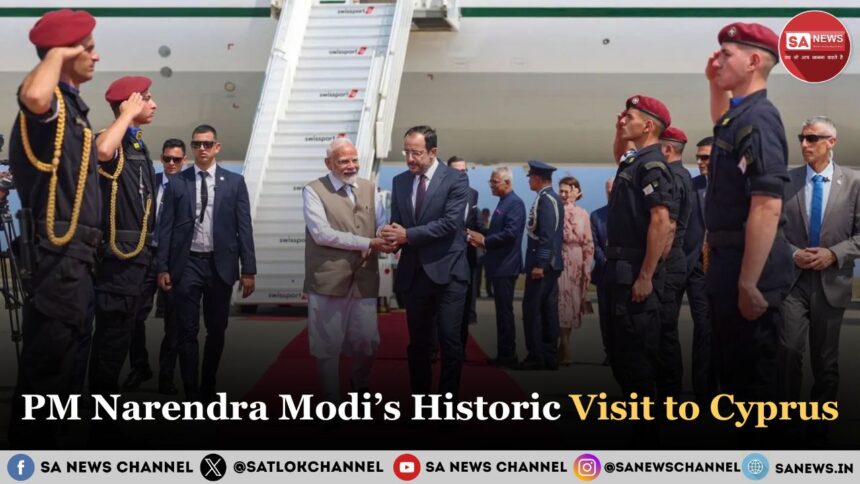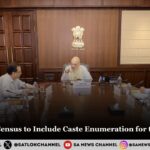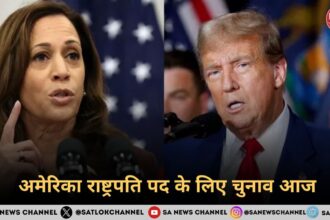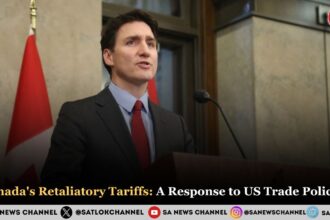In a significant diplomatic event, Prime Minister Narendra Modi visited Cyprus on June 15–16, 2025, which is the first time an Indian leader has visited in over 23 years. Welcomed by President Nikos Christodoulides, Modi’s two-day visit highlighted the island’s important role in the India–Middle East–Europe Corridor (IMEC)—a key trade route connecting Asia to Europe.
- Strengthening Bilateral Ties with Cyprus
- Economic Collaboration: Unlocking New Potential
- Cyprus and the India-Middle East-Europe Economic Corridor (IMEC)
- Defense and Security Cooperation
- Cultural and Educational Diplomacy
- A Strategic European Partner Ahead of the EU Presidency
- Conclusion: Diplomacy with Depth and Direction
- Sant Rampal Ji Maharaj’s Gyan: A Spiritual Insight on Global Equality
With rising geopolitical tensions in the Mediterranean, particularly regarding Turkey, this visit conveys a strong message about India’s increasing involvement. More than just a symbolic gesture, Modi and Cypriot leaders engaged in important discussions with business and defense sectors, initiating trilateral cooperation with Greece, and progressing agreements in finance, tourism, and security. In this blog, we will explore the significance and scope of this historic outreach in the Mediterranean.
Strengthening Bilateral Ties with Cyprus
The trip to Nicosia, the capital of Cyprus, highlights a renewed focus on building stronger bilateral ties between the two nations. PM Modi’s high-level discussions with Cypriot President Nikos Christodoulides will cover a wide range of subjects, including:
- Trade and investment
- Financial services and technology collaboration
- Defense and security cooperation
- Renewable energy and shipping
- Cultural and educational exchange
India views Cyprus not only as a partner in bilateral trade but also as a gateway to European markets.
Economic Collaboration: Unlocking New Potential
Cyprus has long been recognized as a business and financial hub within the European Union, especially in sectors such as shipping, legal services, and finance. With India’s rise as a global manufacturing and technology powerhouse, the two countries have ample room to expand mutual investment, particularly in:
- Information technology
- Pharmaceuticals and healthcare
- Renewable energy infrastructure
- Digital innovation and startups
PM Modi’s interaction with business leaders in Limassol, a prominent commercial hub in Cyprus, reflects a shared intent to scale up trade volumes and boost private sector cooperation.
Cyprus and the India-Middle East-Europe Economic Corridor (IMEC)
One of the most critical strategic components of this visit is Cyprus’s potential role in the India-Middle East-Europe Economic Corridor (IMEC)—a mega connectivity initiative announced during the G20 Summit. IMEC aims to create a seamless trade, logistics, and energy network linking India with Europe via the Middle East.
Cyprus, owing to its geopolitical location in the Eastern Mediterranean, is well-positioned to support logistical operations, digital linkages, and financial services vital for IMEC’s success. India aims to establish robust institutional and infrastructural collaboration with Cyprus to achieve this vision.
Defense and Security Cooperation
Beyond economics, PM Modi’s visit is expected to enhance defense and security ties. India is looking to broaden its partnerships in:
- Cybersecurity
- Maritime security in the Mediterranean and Indian Ocean
- Counterterrorism cooperation
- Defense technology collaboration and joint training programs
As India expands its indigenous defense manufacturing, strategic collaboration with European partners like Cyprus offers both economic and tactical value.
Cultural and Educational Diplomacy
The visit also aims to strengthen people-to-people relations, a critical pillar of India’s foreign policy. With centuries of diplomatic goodwill between India and Cyprus, PM Modi’s agenda includes:
- Boosting academic partnerships
- Promoting student exchanges and scholarships
- Enhancing tourism cooperation
- Celebrating the Indian diaspora’s role in Cyprus
Modi’s engagement with the Indian community in Cyprus will further cement cultural ties and mobilize diaspora-led diplomacy.
A Strategic European Partner Ahead of the EU Presidency
Cyprus is set to assume the Presidency of the Council of the European Union in early 2026, offering India a timely opportunity to align strategic priorities with the broader European agenda. By strengthening relations now, India seeks to:
- Secure policy support within the EU
- Boost FTA negotiations
- Collaborate on sustainability and digital governance
PM Modi’s diplomatic outreach is part of India’s broader ambition to become a trusted global partner in multilateral affairs.
Conclusion: Diplomacy with Depth and Direction
PM Modi’s visit to Cyprus is much more than symbolic. It represents a calculated strategic engagement, balancing India’s relations with both major powers and smaller but strategically vital nations. Through this trip, India is reinforcing its global influence, securing trade channels, and fostering cultural and technological bridges that can serve national and regional interests for decades to come.
As global observers watch the outcomes of this tour, it is evident that India’s foreign policy is no longer limited to its neighborhood or traditional alliances—it is multidimensional, forward-looking, and inclusive.
Sant Rampal Ji Maharaj’s Gyan: A Spiritual Insight on Global Equality
While nations seek strategic, economic, and cultural alliances, true peace and equality can never be achieved through politics or diplomacy alone. According to Sant Rampal Ji Maharaj, real unity comes when humanity recognizes its common spiritual origin—we are all children of one Supreme God, Kabir Sahib Ji.
Just as caste, religion, or nationality divide people, the quest for power and dominance between nations leads to unrest and inequality. Sant Rampal Ji Maharaj explains that only by understanding Tatvgyan (true spiritual knowledge) and following the path shown by a Tatvdarshi Saint (as mentioned in Gita Chapter 4 Verse 34), can humanity experience lasting peace and unity.
To build a world without boundaries—not just geographically, but spiritually—we must rise above superficial divisions. This is the foundation of true global harmony.
To learn more about this divine knowledge, visit the official YouTube channel of Sant Rampal Ji Maharaj and begin your journey toward true peace and liberation.









